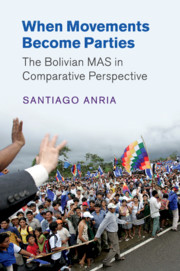Crossref Citations
This Book has been
cited by the following publications. This list is generated based on data provided by Crossref.
Rich, Jessica A. J.
Mayka, Lindsay
and
Montero, Alfred P.
2019.
Introduction The Politics of Participation in Latin America: New Actors and Institutions.
Latin American Politics and Society,
Vol. 61,
Issue. 2,
p.
1.
Bentancur, Verónica Pérez
Rodríguez, Rafael Piñeiro
and
Rosenblatt, Fernando
2019.
Efficacy and the Reproduction of Political Activism: Evidence From the Broad Front in Uruguay.
Comparative Political Studies,
Vol. 52,
Issue. 6,
p.
838.
2019.
Publications Received.
Contemporary Sociology: A Journal of Reviews,
Vol. 48,
Issue. 2,
p.
232.
Niedzwiecki, Sara
and
Anria, Santiago
2019.
Participatory Social Policies: Diverging Patterns in Brazil and Bolivia.
Latin American Politics and Society,
Vol. 61,
Issue. 2,
p.
115.
Hutter, Swen
Kriesi, Hanspeter
and
Lorenzini, Jasmine
2019.
Soziale Bewegungen im Zusammenspiel mit politischen Parteien: Eine aktuelle Bestandsaufnahme
.
Forschungsjournal Soziale Bewegungen,
Vol. 32,
Issue. 2,
p.
163.
Pérez Bentancur, Verónica
Piñeiro Rodríguez, Rafael
and
Rosenblatt, Fernando
2019.
How Party Activism Survives.
2020.
Resource Radicals.
p.
185.
2020.
Resource Radicals.
p.
227.
Rich, Jessica Alexis Jolicoeur
2020.
Organizing Twenty-First-Century Activism: From Structure to Strategy in Latin American Social Movements.
Latin American Research Review,
Vol. 55,
Issue. 3,
p.
430.
2020.
Resource Radicals.
p.
138.
Halvorsen, Sam
2020.
The geography of political parties: Territory and organisational strategies in Buenos Aires.
Transactions of the Institute of British Geographers,
Vol. 45,
Issue. 2,
p.
242.
2020.
Resource Radicals.
p.
57.
2020.
Resource Radicals.
p.
29.
2020.
Resource Radicals.
p.
77.
Eaton, Kent
2020.
Bogotá's Left Turn: Counter‐Neoliberalization in Colombia.
International Journal of Urban and Regional Research,
Vol. 44,
Issue. 1,
p.
1.
2020.
Resource Radicals.
p.
164.
Lewis, Janet I.
2020.
How Insurgency Begins.
Stoyan, Alissandra T.
2020.
Ambitious Reform Via Constituent Assemblies: Determinants of Success in Contemporary Latin America.
Studies in Comparative International Development,
Vol. 55,
Issue. 1,
p.
99.
2020.
Resource Radicals.
p.
1.
Brinks, Daniel M.
Levitsky, Steven
and
Murillo, María Victoria
2020.
The Politics of Institutional Weakness in Latin America.





